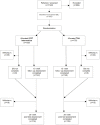The impact of individual Cognitive Stimulation Therapy (iCST) on cognition, quality of life, caregiver health, and family relationships in dementia: A randomised controlled trial
- PMID: 28350796
- PMCID: PMC5369684
- DOI: 10.1371/journal.pmed.1002269
The impact of individual Cognitive Stimulation Therapy (iCST) on cognition, quality of life, caregiver health, and family relationships in dementia: A randomised controlled trial
Abstract
Background: Cognitive stimulation therapy (CST) is a well-established group psychosocial intervention for people with dementia. There is evidence that home-based programmes of cognitive stimulation delivered by family caregivers may benefit both the person and the caregiver. However, no previous studies have evaluated caregiver-delivered CST. This study aimed to evaluate the effectiveness of a home-based, caregiver-led individual cognitive stimulation therapy (iCST) program in (i) improving cognition and quality of life (QoL) for the person with dementia and (ii) mental and physical health (well-being) for the caregiver.
Methods and findings: A single-blind, pragmatic randomised controlled trial (RCT) was conducted at eight study sites across the United Kingdom. The intervention and blinded assessment of outcomes were conducted in participants' homes. Three hundred fifty-six people with mild to moderate dementia and their caregivers were recruited from memory services and community mental health teams (CMHTs). Participants were randomly assigned to iCST (75, 30-min sessions) or treatment as usual (TAU) control over 25 wk. iCST sessions consisted of themed activities designed to be mentally stimulating and enjoyable. Caregivers delivering iCST received training and support from an unblind researcher. Primary outcomes were cognition (Alzheimer's Disease Assessment Scale-cognitive [ADAS-Cog]) and self-reported QoL (Quality of Life Alzheimer's Disease [QoL-AD]) for the person with dementia and general health status (Short Form-12 health survey [SF-12]) for the caregiver. Secondary outcomes included quality of the caregiving relationship from the perspectives of the person and of the caregiver (Quality of the Carer Patient Relationship Scale) and health-related QoL (European Quality of Life-5 Dimensions [EQ-5D]) for the caregiver. Intention to treat (ITT) analyses were conducted. At the post-test (26 wk), there were no differences between the iCST and TAU groups in the outcomes of cognition (mean difference [MD] = -0.55, 95% CI -2.00-0.90; p = 0.45) and self-reported QoL (MD = -0.02, 95% CI -1.22-0.82; p = 0.97) for people with dementia, or caregivers' general health status (MD = 0.13, 95% CI -1.65-1.91; p = 0.89). However, people with dementia receiving iCST rated the relationship with their caregiver more positively (MD = 1.77, 95% CI 0.26-3.28; p = 0.02), and iCST improved QoL for caregivers (EQ-5D, MD = 0.06, 95% CI 0.02-0.10; p = 0.01). Forty percent (72/180) of dyads allocated to iCST completed at least two sessions per week, with 22% (39/180) completing no sessions at all. Study limitations include low adherence to the intervention.
Conclusions: There was no evidence that iCST has an effect on cognition or QoL for people with dementia. However, participating in iCST appeared to enhance the quality of the caregiving relationship and caregivers' QoL.
Trial registration: The iCST trial is registered with the ISRCTN registry (identified ISRCTN 65945963, URL: DOI 10.1186/ISRCTN65945963).
Conflict of interest statement
I have read the journal's policy and the authors of this manuscript have the following competing interests: LY, MO, PL, AS, RTW, and VO have a patent: iCST Manual. MO reports grants from UCL during the conduct of the study and grants from UCL outside the submitted work. MO, AS, and RTW have a patent: Making a Difference manuals 1 and 2. RTW reports royalties for the sales of the Making a Difference manuals (1,2, and 3) on behalf of DSDC Wales, Bangor University (Hawker Publications & Freiberg Press, US). AS reports personal fees from NHS trusts, outside the submitted work. AB reports personal fees from International Journal of Geriatric Psychiatry, personal fees from NHS England, personal fees from various lectures and talks, personal fees from occasional court reports, other from Kings College London, and other from DVLA, outside the submitted work. IR reports grants from UCL, both for the submitted work and outside the submitted work.
Figures
References
-
- Alzheimer’s Association. Alzheimer’s Disease Facts and Figures. Alzheimers Dement. 2015; 11(3): 332 https://www.alz.org/facts/downloads/facts_figures_2015.pdf - PubMed
Publication types
MeSH terms
Associated data
Grants and funding
LinkOut - more resources
Full Text Sources
Other Literature Sources
Medical


